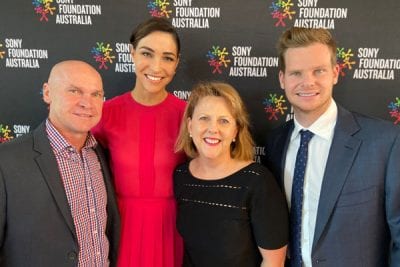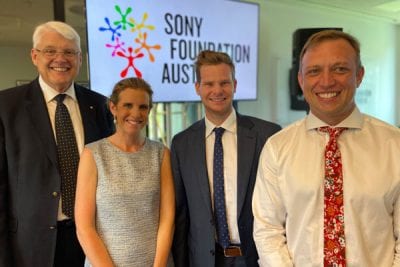You Can fight cancer at RBWH’s new home-away-from-home for young patients
Queensland’s largest hospital is now home to the state’s first fully-dedicated centre for young people having cancer treatment, thanks to the collaborative efforts of the Sony Foundation and Royal Brisbane and Women’s Hospital (RBWH).
Minister for Health and Minister for Ambulance Services Steven Miles has today joined Australian cricketer and Sony Foundation ambassador Steve Smith in officially unveiling the $2.5 million centre.
“This dedicated centre is now a social hub where young patients can meet people their own age, facing the same emotional and physical
issues, where they can just hang out and try to find a little bit of normal,” Minister Miles said.
“There sometimes are gaps in care and supports between paediatric and adult health services, and this new centre will offer adolescents and young adults the best possible chance to respond to their diagnosis and treatment.”
The centre now occupies a previously disused rooftop space at RBWH, thanks to a $1.8 million donation from Sony Foundation and a $700,000 funding commitment from Metro North and the Department of Health.
It’s been designed to act as a social haven for 15 to 25-year-olds away from the hospital ward, with a kitchen, relaxation areas, Sony entertainment technology, study area, yoga and consult rooms, and landscaped outdoor areas to just hang out.
“Teenagers have a lot on their plate already with study, work and social activities. I can’t imagine what it’s like to have to then deal with something as terrifying as a cancer diagnosis, and face everything that goes with that,” Mr Miles said.
In 2010, Sony Foundation established ‘You Can’, a youth cancer program to fund specialised youth cancer centres and services around Australia to address the current gap in the system.

CEO of Sony Foundation Sophie Ryan said to date, they had donated more than $8 million to funding youth cancer initiatives including You Can Centres in Perth and Melbourne, cancer research and support services.
“Today is a significant milestone on our journey to improve the overall experience from treatment to survivorship for young cancer patients,” Ms Ryan said.
“For too long our young people have fallen through the gap, too old for children’s hospitals, yet too young to be alongside the elderly in adult wards. Sony Foundation’s ‘You Can’ campaign is committed to ensuring they are treated in age-appropriate environments.”
“We cannot thank our incredible donors and supporters enough to for helping us create what we know will be a place of solitude, comfort and comradery for these young patients to enjoy activities together and support each other.”
RBWH Executive Director of Cancer Care Services Associate Professor Glen Kennedy said the centre would be life-changing for young patients from all over Queensland who come to RBWH for treatment.
“In every way possible this is a massive step forwards and we are so incredibly proud of the dedication and work that has gone into making this a reality for our patients.”
For more information about You Can or to donate, please visit www.sonyfoundation.org
Background
- Around 1200 Australians aged 15 – 24 years are diagnosed with cancer each year
- Around three Queenslanders aged 15 – 24 are diagnosed with cancer each week and most – around 140, will go on to receive treatment at RBWH
- These patients don’t fit into children’s or adult services
- RBWH’s Cancer Care Service is the largest in Queensland and one of the largest in the country
- Other Cancer Care Services include Gold Coast, Townsville and the Princess Alexandra
- It provides more than 160,000 cancer care treatments, consultations, procedures and other services each year
- The service is also a quaternary referral centre for complex adolescent and young adult cancer cases
- The service provides the largest bone marrow transplant program in Australia and quaternary and tertiary services in medical oncology, radiotherapy/brachytherapy, and malignant and non-malignant haematology
- By the end of 2014, 783 people in the 15 – 24 age group were living with cancer.

